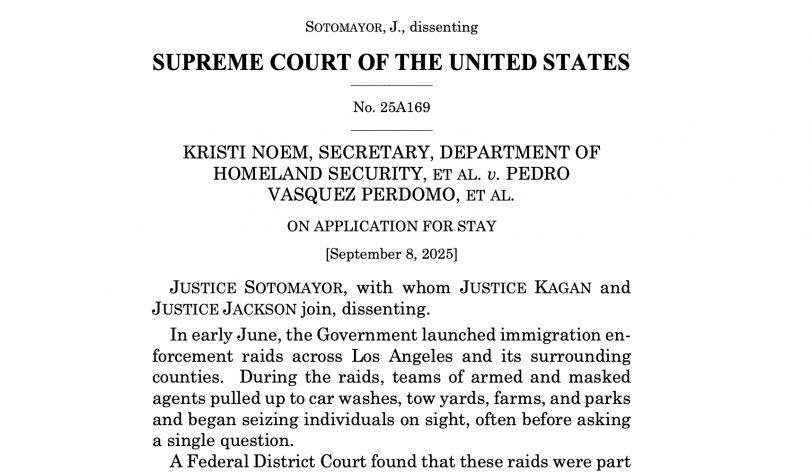Approximately a month ago, on, August 7, the Trump administration filed an application for review by the U.S. Supreme Court in the case of Vasquez Perdomo v. Noem, in the hope that the Supremes will lift the temporary order by the Ninth Circuit, which barred federal agencies—including DHS—from continuing their unlawful actions in Los Angeles and surrounding counties.
Today, the Trump administration got its wish, at least temporarily.
(For readers aren’t yet familiar with the history of this case, or have forgotten, a quick skim of WLA’s story published on August 5, 2025, will bring you reasonably up to date.)
Now, today, almost exactly a month after Trump & Co brought its legal woes to the nation’s highest court, while the Supremes didn’t exactly rule, the conservative majority imposed a pause on the ruling on the topic that was handed down on July 11, 2025, by Los Angeles-located U.S. District Judge Maame Ewusi-Mensah Frimpong.
Judge Frimpong’s ruling, as readers may remember, barred government agents in the Central District of California – an area with a population of approximately 20 million people – from making immigration stops based on racial profiling without reasonable suspicion that the person being stopped is in the United States illegally.
Today’s SCOTUS order was unsigned, and the conservative majority on the court didn’t really really express its reasoning all that fully, but the order basically accomplished what the Trump administration most wanted.
Here is how Amy Howe, co-founder and primary reporter of the must-read SCOTUSblog put the matter:
Monday’s order by the Supreme Court puts Frimpong’s ruling on hold while the Trump administration’s appeals continue. In an opinion agreeing with the decision to grant the government’s request for a stay, Justice Brett Kavanaugh emphasized what he characterized as the narrow role of judges in immigration cases. Judges, he wrote, “may have views on which policy approach is better or fairer. But judges are not appointed to make those policy calls.
Kagan speaks
A glance at the liberal side of the SCOTUS bench, shows Justice Elena Kagan, Justice Ketanji Brown Jackson, and Justice Sonia Sotomayor, who have all signed on to a strong dissent written by Justice Kagan.
Although Kagan’s dissent is 21-pages long, its last paragraph makes her point efficiently:
The Fourth Amendment protects every individual’s constitutional right to be “free from arbitrary interference by law officers.” Brignoni-Ponce, 422 U. S., at 878. After today, that may no longer be true for those who happen to look a certain way, speak a certain way, and appear to work a certain type of legitimate job that pays very little. Because this is unconscionably irreconcilable with our Nation’s constitutional guarantees, I dissent.
Meanwhile, back in LA
In Los Angeles, when the ruling became public today, Mayor Karen Bass had this to say:
“The Supreme Court’s decision to stay the Temporary Restraining Order that blocked federal agents from racially profiling and discriminating against Angelenos because of the color of their skin, their accent, speaking Spanish and their place of work.
“I want the entire nation to hear me when I say this isn’t just an attack on the people of Los Angeles, this is an attack on every person in every city in this country. Today’s ruling is not only dangerous – it’s un-American and threatens the fabric of personal freedom in the United States of America.”
So what’s next?
Arguably, it appears that he main thing the government wants to escape with its appeal is is the legal reach of last month’s 52-page ruling by Federal Judge Frimpong, with which Frimpong demonstrated the importance of the legal tool known as the Temporary Restraining Order or TRO, a legal entity that the Trump administration believes it can make vanish, at least temporarily, with the help of the majority of the highest court in the land.
On the issue of next steps, the Southern California ACLU had this to say:
“Today’s unexplained order from the Supreme Court does not halt further proceedings in the case. On September 24, the federal district court will hear arguments on whether to issue a preliminary injunction based on additional evidence of the government’s unlawful tactics.”
More as we know it.


It doesn’t matter if there will be another hearing for another injunction. The Supreme Court has signaled that policy should Not be in the hands of the Court. They will overturn any future injunctions. ICE will continue to operate as they have been. Injunctions or not.
Just like to point out my predictions regarding judge Pong’s shenanigans have been 100% accurate. (See my comment three stories down, the one about 9th circuit slapping). Meanwhile Celeste’s ham fisted gaslighting hasn’t just been 100% wrong it’s been the exact opposite of right.
This is deeply concerning. The Supreme Courts decision to stay the judges ruling feels like a step backward for basic constitutional rights. Its clear that the administration is trying to bypass reasonable suspicion standards for immigration stops, targeting people based solely on their appearance or background. Justice Kagans dissent highlights how dangerous this precedent is – if the Fourth Amendment can be ignored for certain groups, whats next? Mayor Bass is right, this isnt just an attack on Los Angeles, its an attack on the principle of equality. It’s frustrating that the Court didnt even explain its reasoning fully, making this even more unsettling. We can only hope that the upcoming arguments will bring more clarity and that the initial rulings protections will eventually be restored.Mercury Coder
https://www.foxla.com/news/michael-robert-maxwell-arrested-newport-beach-church-staffer-sexual-assault
So the Dropkick Murphys will be playing Thursday at the Lincoln Memorial for the Remove the Regime rally.
I don’t know, CF. Once you’ve lost the Celts…
“…I don’t know, CF. Once you’ve lost the Celts……”
Agreed, Jim!
PS: I’m just sorry I couldn’t teleport to see them with Mr.Lincoln. xo